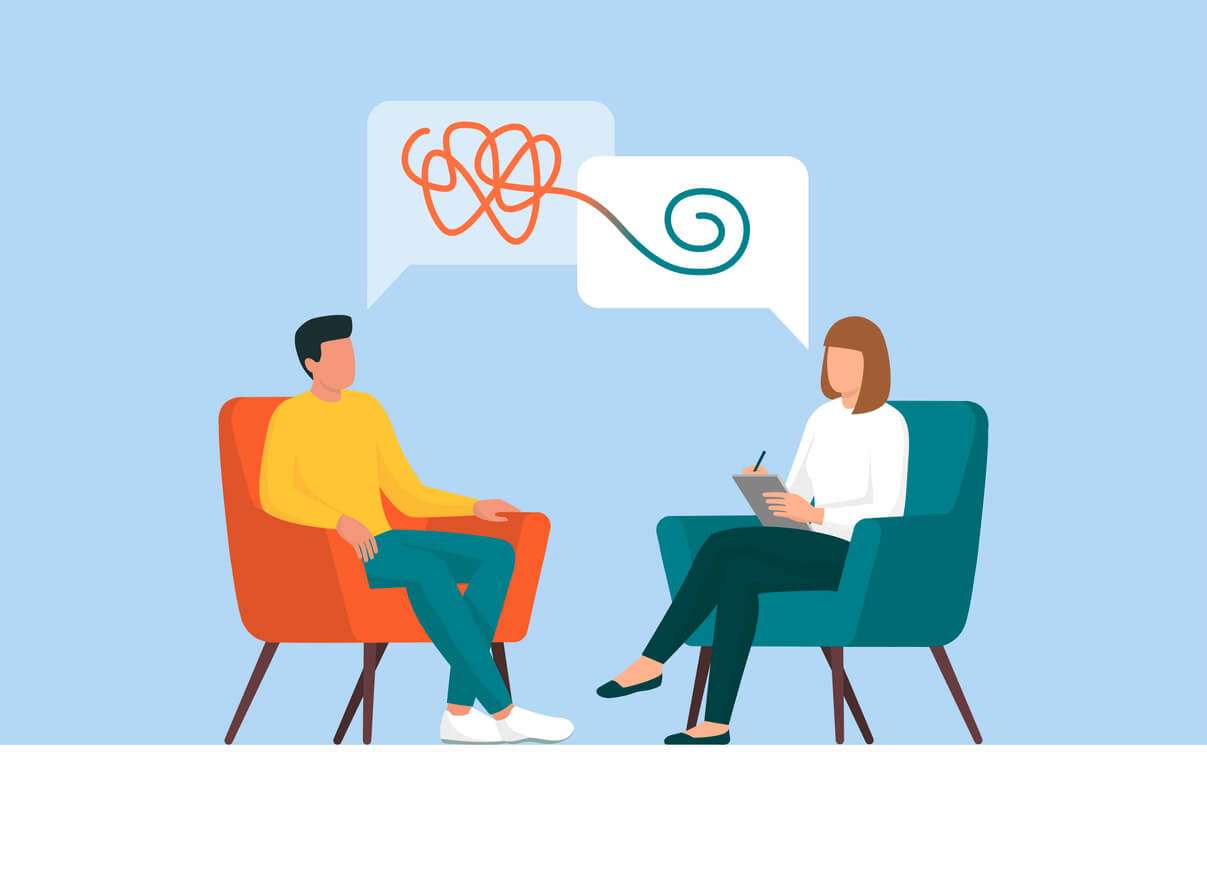
Licensed professional counselors and therapists provide mental health services, but they differ in education and training. A therapist usually holds a master’s degree or higher in counseling, which is not always the case with a mental health counselor. In addition, licensing requirements vary from state to state regarding who can use these titles, what credentials they must hold, and how much experience they need.
Counselors provide treatment through talk therapy – listening to patients express their feelings about their lives – while therapists employ a variety of techniques, including cognitive-behavioral therapy (CBT). When you are in need of mental health services, it’s important to know which type of professional to visit.
The Difference Between Counselors and Therapists
When we think about mental health, it’s common to think of therapists as providers who take care of people emotionally. However, in some states, counselors do the same jobs as therapists. There are many different types of mental health professions. The term “mental health professional” covers a wide range of people who work in occupations such as psychiatrists, psychologists, clinical social workers, psychiatric nurses, and other mental health therapists. When you need help with a mental health issue or addiction, a counselor can help you in many ways. If there are services you need beyond a counselor’s jurisdiction, they can refer you to a psychotherapist.
The Career Differences
The term counselor is often used to describe a person working in the field of mental health. The reality is that there are a variety of counseling jobs available with a lot more variety within these job titles than most people realize. The term therapist has come to refer almost exclusively to two different groups: psychotherapists or clinical social workers. Regardless of the career path, counselors and therapists are qualified to assist with all sorts of mental health issues. While their treatment approaches may differ, you can benefit greatly from seeing either of them.
The Theoretical Similarities
Counselors, psychotherapists, and clinical social workers all provide what is called “talk therapy.” A therapist or counselor typically does not prescribe medication, and instead, they try to help the patient talk about their issues, so they can better understand themselves. The therapist or counselor listens, asks questions, and provides feedback in an effort to help the client see their problems from a different perspective. The ultimate goal of this process is for the client to identify achievable changes that will improve their quality of life.
The term counseling has come to represent all mental health professions that don’t involve prescribing medications as part of treatment. Counseling includes activities such as marital counseling, career counseling, school-related problems, drug abuse, and addiction, as well as grief and loss counseling or interventions.
Epic Health Partners in Danville, Martinsville, and Richmond, VA
Epic Health Partners, LLC is a community-based behavioral health services provider for those in need of mental assessments and services. We serve both adults and children. Our programs provide care and support that enable individuals to reach and maintain stability and independence in the most appropriate, least restrictive environment.
Call us at (434) 835-4601 or set up an appointment online. We look forward to serving you.
If you are considering a career as a mental health professional, it can be exciting (and potentially overwhelming) to learn of the many job titles and career paths available to pursue. While the variety of jobs increases your chances of aligning your career and interests, understanding the differences among available roles can make choosing the “right” path a daunting task.
Three of the most common job titles in the mental health industry are counselor, therapist, and psychologist. But what is the difference between these job titles? Are counselors, therapists, and psychologists really that different from one another, or are they more similar than different?
While there is overlap between these three careers, there are specific differences which you should understand before embarking on a career in the field. Here, we explore those differences.
Ready to Make a Difference?
Download our free Counseling Psychology Career Guide to learn how.
DOWNLOAD NOW
What is a counselor?
The term counselor is used to broadly refer to a professional trained in the fields of psychology, counseling, social work, or a range of medical fields such as nursing. Mental health counselors, specifically, are those professionals working in a mental health capacity.
Mental health counselors perform many functions and responsibilities. Their duties include conducting patient evaluations, providing education and informational resources to their clients, and making suggestions that the client or patient can use to solve the problem they are seeking counseling to address. Often, mental health counselors will specialize in addressing a particular issue, such as substance abuse, sexual abuse, marriage and relationships, or family counseling, among others.
What is a therapist?
A therapist is an individual that has been professionally trained to provide some form of therapy to a patient or client that addresses either mental or physical disorder. Examples of therapy used in the context of physical medicine can include physical therapists and occupational therapists. In the context of mental health, the terms mental health therapist and psychotherapist are common.
As with counselors, therapists will often specialize in addressing particular client issues, such as marriage and family issues, substance abuse, etc.
The Difference Between Therapists and Counselors
If the two definitions above sound very similar, it’s because they are. Mental health counselors and therapists occupy the same professional space, treating the same issues within the same patient populations. Even within the industry, you can find the terms used interchangeably in some contexts.
However, the key difference between counselors and therapists lies in the approach to treatment that they take.
As a practice, counseling often addresses specific problems, challenges, or behaviors in a patient’s life in a very practical way. A counselor working with a patient who suffers from anxiety might, for example, provide the patient with different tactics that they can use to ward off a pending panic attack. Or they might give an alcoholic patient a set series of steps to follow when they feel a craving coming on. In this regard, there is a certain problem-solving approach inherent in counseling.
Therapists work to help their patients address similar issues, and often provide the same advice that counselors might. However, a key difference is that therapists often seek to go deeper by helping the patient understand the how and why behind a challenge. For example, what scenarios tend to bring on an alcoholic craving and why; what situations are more likely to trigger a panic attack and why? What is the root of these issues? They seek to identify the source of these issues through a combination of talk therapy and other frameworks.
As such, counseling is often (though not always) a short-term approach, arming the patient with tools they can put into action immediately to begin living a more healthy life. Therapy, on the other hand, is often a longer-term process that can last months or even years as the therapist and client seek out the root of the issues being addressed to make lasting change.
Despite these differences, there is significant overlap between therapists and counselors, and they will often borrow from each other’s playbook. Additionally, both therapists and counselors will typically be master’s level clinicians licensed by the state in which they practice. A Master of Science in Counseling Psychology is a commonly held degree, and common licenses include Licenced Mental Health Counselors (LHMCs) and Licensed Professional Counselors (LPCs). Licensed Clinical Social Workers (LCSWs) may also hold the title of counselor or therapist.
What is a psychologist?
Another common job title within mental health counseling is that of a psychologist. Whereas therapists and counselors may be considered more alike than different, the difference is more pronounced for psychologists.
A psychologist is similar to mental health counselors and therapists in that they also work to improve their patients’ mental and emotional health. The techniques and frameworks that they use tend to differ, however. Additionally, psychologists are more likely than counselors to treat patients with severe mental disorders. With this in mind, becoming a counseling psychologist will typically require a higher level of education, such as earning a PhD in Counseling Psychology.
Choosing The Right Career For Your Future
If you’re considering entering the mental health field, it’s important to understand the various available job functions so you can choose a career path that aligns with your interests and goals. While there are many different variations of the titles discussed above, the most common will be counselor, therapist, and psychologist. Though these are related in many ways, the differences are also significant and can substantially change the trajectory of your career.
Jumpstart your career today by learning more about the skills and experience needed to succeed in counseling psychology.

The terms “counselor” and “psychotherapist” are often used interchangeably and have many similarities, but there are some important differences as well. In general, counseling is recommended for specific issues and situations, such as addiction or grief, and takes place over weeks to several months.
Psychotherapy, in contrast, tends to explore past issues that might be contributing to present day problems. It often takes place continually or intermittently over a period of years. In actual practice, however, there is a great deal of overlap between the two types of therapies.
Understanding some more of the differences between counseling and psychotherapy may be helpful in choosing the type of therapy that will be most effective for you as an individual.
Counseling vs. Psychotherapy
While the same therapist may provide both counseling and psychotherapy, psychotherapy generally requires more skill than simple counseling. It is conducted by professionals trained to practice psychotherapy such as a psychiatrist or psychologist, a trained counselor, or a social worker.
While a psychotherapist is qualified to provide counseling, a counselor may or may not possess the necessary training and skills to provide psychotherapy.
That said, a therapist may provide counseling with specific situations and a counselor may function in a psychotherapeutic manner.
Counseling
Technically speaking, “counselor” means “advisor.” It involves two people working together to solve a problem. It is a term that is used in conjunction with many types of advice giving. For example, financial planning and spiritual guidance are both types of counseling.
Just about anyone may claim to be a counselor if they are in the role of giving advice. The term counseling may also properly be used to refer to what occurs in a relationship with a psychotherapist.
In the context of mental health, “counseling” is generally used to denote a relatively brief treatment that is focused primarily on behavior. It often targets a particular symptom or problematic situation and offers suggestions and advice for dealing with it.
In this setting, the counselor offers guidance and support as the individual figures out ways to better manage life and adjust to change or adversity.
There are many types of counselors, such as marriage and family therapists, grief counselors, addiction and substance abuse counselors, and more.
Psychotherapy
“Psychotherapy” on the other hand is generally a longer-term treatment that focuses more on gaining insight into chronic physical and emotional problems. Its focus is on the person’s thought processes, and how these may be influenced by past events such that they cause problems in the present.
In other words, psychotherapy addresses the root cause and core issues of current problems so that lasting change and personal growth may occur.
There are several different types of therapy that fall under the general heading of psychotherapy, including approaches such as cognitive behavioral therapy, dialectical behavior therapy, psychoanalytic psychotherapy, and much more.
Similarities
There are many similarities between counseling and psychotherapy, and even with the distinction, counseling often includes some psychotherapy and psychotherapy often includes some counseling. Similarities include:
- Development of a healing, safe, and therapeutic relationship between a therapist and an individual
- Effectiveness for a wide range of people, both adults and children
- Understanding a person’s feelings and behaviors, and addressing issues with the goal of improving a person’s life
Differences
While mental health professionals with more advanced degrees (eg. psychology PhD or PsyD) are more likely to provide psychotherapy, the same provider may do both types of therapy. There are some key differences between the providers, however.
Counseling
-
Focus on present problems and situations
-
Specific situations or behaviors
-
Short term therapy (for a period of weeks and up to 6 months)
-
Action and behavior focused
-
Talk therapy
-
Guidance, support, and education to help people identify and find their own solutions to current problems
-
Secondary process
Psychotherapy
-
Focus on chronic or recurrent problems
-
Overall patterns, big picture oriented
-
Long term therapy, either continuous or intermittent over many years
-
Feeling and experience focused
-
May include testing (such as personality, intelligence), talk therapy, other therapies such as cognitive behavioral therapy
-
In-depth focus on internal thoughts/feelings (core issues) leading to personal growth
-
Primary process
How to Choose Between a Counselor and Psychotherapist
When choosing a therapist, it’s helpful to learn about the differences noted above, as well as the background of specific providers and the approaches they use. Sometimes the choice will come down to personal preferences, access, or insurance coverage.
The most important step, however, is to find a therapist you can trust. In fact, the level of trust a person has in their mental health care practitioner plays the greatest role in whether the therapy will be successful or not.
You may actually need to talk with a provider or visit for a few appointments before you know which type of therapy is best for you. For example, with some situations it can be difficult to know if it is a short term, a limited problem you are facing (and thus, may fall under conditions best treated with counseling), or if instead there are events or situations in your past that are leading to the current problem.
When You May Wish to See a Counselor
Counseling may be a better option than psychotherapy if:
- You have specific issues or short term problems you wish to address
- You wish to learn coping skills to help better manage stress and improve relationships
- You are coping with life transitions and adjustments, such as divorce or grief
- You are coping with addiction issues
- You are looking for someone who is essentially a “coach” who can guide and support you as you learn to recognize problems and formulate healthy solutions yourself
When You May Wish to See a Psychotherapist
A psychotherapist may be a better option if:
- You have problems that are significantly impacting your life and relationships
- You are coping with past trauma, or if you believe situations in the past may be playing a role in your current issues
- Your present issues are chronic or recurring concerns
- You have a chronic medical condition (such as autoimmune disease, cancer, etc.) that is affecting your emotional well-being
- You have a diagnosed mental health condition such bipolar disorder or a major anxiety disorder
- You have seen a counselor and your issues aren’t improving even though you’ve been actively working on solutions
Counseling vs. Psychotherapy for Depression
Both counseling and psychotherapy are used in the treatment of depression, and the choice can depend on the severity of the depression, whether it is a new issue for you or rather an ongoing or recurrent problem and more.
As far as the effectiveness of the two approaches, a 2016 study found that counseling was just as effective for the treatment of previously untreated mild to moderate depression diagnosed in primary care.
Another 2016 study, however, found that interpersonal psychotherapy was somewhat more beneficial than counseling in adolescents with depression, with respect to both symptoms, and overall functioning over the short-term. That said, a 2018 study looking at the same group found that long term, the effects of counseling were more beneficial.
People with chronic, severe depression might benefit most from psychotherapy, whereas people with mild to moderate depression may benefit most from developing a good relationship with a therapist based on mutual trust, and then talking with them about which approach would be most helpful.
Preparing for a Visit With Counselor or Psychotherapist
Whether you choose to see a counselor or a psychotherapist, your initial appointment will likely be more rewarding if you do a little homework ahead of time. Doing so will not only help you clarify why you are seeking professional help but will help the provider you see know whether she believes she will be able to help you or not.
Before your appointment, make a list of:
- Any issues, concerns, or symptoms you are coping with, even if they seem to be unrelated or are not the reason why you are seeking therapy
- Key personal information, including any major stresses or recent life changes
- All medications, vitamins or other supplements that you’re taking, including doses
- Questions to ask your healthcare provider
Depression Discussion Guide
Get our printable guide to help you ask the right questions at your next doctor’s appointment.
:max_bytes(150000):strip_icc()/illo_Doctor-discussion-guide-mind-08-5c60ad2a46e0fb000158767e.png)
Download PDF
A Word From Verywell
There are some reasons why you may wish to choose a counselor instead of a psychotherapist, or vice versa, but the most important step is getting started. It can take some time to find a therapist who you fully trust, and you may need to visit a few providers before you find the right fit. Keep in mind that you are the consumer, and it’s OK to shop around. Personalities differ, and the best therapist for someone else may not be the right therapist for you.



